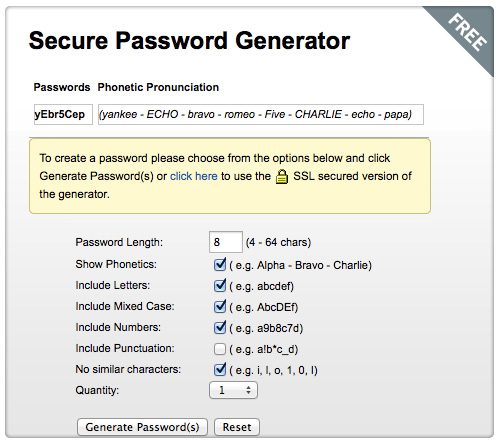

If your password is indeed a regular word, you’ll only survive a dictionary attack if your word is wildy uncommon or if you use multiple word phrases, like LaundryZebraTowelBlue. Whereas a brute force attack tries every combination of symbols, numbers, and letters, a dictionary attack tries a prearranged list of words such as you’d find in a dictionary. This attack is exactly what it sounds like - the hacker is essentially attacking you with a dictionary. If nothing else, we learn from brute force attacks that password length is very important. Generally, anything under 12 characters is vulnerable to being cracked. It has the ability to try 350 billion guesses per second.
#A STRONG PASSWORD GENERATOR WITH WORDS CRACK#
In 2012, an industrious hacker unveiled a 25-GPU cluster he had programmed to crack any 8-character Windows password containing uppercase and lowercase letters, numbers, and symbols in less than six hours.
#A STRONG PASSWORD GENERATOR WITH WORDS SOFTWARE#
The attacker automates software to try as many combinations as possible in as quick a time as possible, and there has been some unfortunate headway in the evolution of that tech. This attack tries to guess every combination in the book until it hits on yours. These attacks can be aimed at your actual accounts or possibly at a leaked database of hashed passwords. And if that’s the case, they’re bound to use one of the methods below. īut if you’ve been wise enough to keep your passwords off the aggregated blackmarket lists, cybercriminals have to crack them. There’s big money in the buying and selling of login credentials and passwords on the blackmarket, and if you’ve been using the same password for many years, chances are it’s been compromised. How does a password get hacked?Ĭybercriminals have several password-hacking tactics at their disposal, but the easiest one is simply to buy your passwords off the dark web. But before jumping to that, let’s first take a look at the various ways passwords can be hacked, so that you understand the most common methods being used today. So, what's the solution? Uncrackable passwords. If your passwords were part of a breach, you will want to change them immediately. Your passwords grant access into your own personal kingdom, so you are probably thinking 'what are the best practices to create a strong password' to protect your accounts against these cybercriminals. To name a few, we’ve reported on Carnival Cruises, ProctorU and Garmin. If you’ve been reading, you may have noticed a particularly nasty trend claiming new victims week after week - data breaches. Try these password ideas to make your accounts unbreakable.Įvery week, our researchers round up the latest security news and report our findings in these blog pages. The best passwords will thwart brute force and dictionary attacks, but it's also possible to make them easy to remember.


 0 kommentar(er)
0 kommentar(er)
